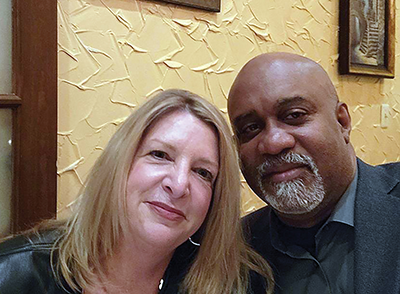Prostate Cancer Survivor
Lessons from a two-time cancer survivor

Howard Gaines knows how much it helps to have someone by your side during a cancer diagnosis and through treatment. After enduring colon cancer on his own, he appreciated the support of his girlfriend and medical team when he faced a second cancer, this time in his prostate. He now aims to help others navigate cancer.
After two cancer diagnoses and two full courses of treatment, everything is in a good place right now. I am sharing what I discovered along the way in hopes other people can learn from my experience and, as a result, be hopeful as they move forward.
Don’t try to go it alone. Cancer is not a solo job. My colon cancer was Stage I, and the recommended treatment was surgery so I didn’t have the many decisions to make like I did the second time around. With prostate cancer, I had to determine the type of treatment that was best for the quality of life I wanted to maintain. I am an avid bicycle rider, and the physical nature of prostate cancer alone made me question any treatment that might mean I could no longer ride my bike. My girlfriend Lisa helped coordinate appointments with the oncologist, surgeon and radiologist, and she went with me to all of them so we could hear all my options. There were times she could tell my eyes were glazing over. It was so helpful to have her with me.
Choose a doctor you trust. We expected to have each specialist try to talk us into having the type of treatment they were offering. We were a little surprised when the radiologist suggested I not have radiation. Instead, she recommended the surgical option of a prostatectomy. After talking with the surgeon and doing a lot of my own research, I opted for the prostatectomy and found a surgeon who is considered an expert in his field. I appreciated being surrounded by professionals who were genuinely interested in what was best for me.
However, that wasn’t always the case. I didn’t stay with the first urologist I saw. He had no bedside manner and talked at me instead of to me. I didn’t feel like I could communicate with him. That translated to a lack of trust. I asked my primary care physician to recommend another urologist, and that is how I was connected to my excellent medical team.
Make sure you have resources. Lisa is a NICU nurse, but she didn’t have a lot of experience with cancer. The medical knowledge she has, however, guided me to advocate for myself, be persistent and ask questions that I wouldn’t have otherwise.
Obviously, not everyone has a medical professional in their life, so it’s important to ask your doctor whom you can reach out to any time, day or night. I was assigned a nurse navigator who explained my diagnosis and touched base with me weekly to ensure I knew what to expect, ask how I was doing and answer any questions. She was interested in my emotional well-being, too. I had many concerns about how my life would be affected by prostate cancer treatment. I was 58, and I still had many years of being physically and sexually active ahead of me. She offered resources in case I wanted to talk with a professional or another prostate cancer survivor who’d had the same procedure I was preparing to have. I’m a very private person and I didn’t end up getting that type of support, but it helped to know it was available.
Be prepared for stumbling blocks. Lisa and I joke that if something is going to happen, it’ll happen to me. I had allergic reactions to medications and had to have a second procedure to address and correct incontinence. There were times that I wondered what I’d gotten myself into. Lisa and her daughter, a nursing student, used humor to help me cope.
Stay on top of your preventive health care. Both my cancers were caught early because of preventive medical visits. I had a colonoscopy at the recommended age of 50 and, luckily, the cancer that was found was Stage I.
In the case of the prostate cancer, my doctor and I were keeping a close eye on my PSA. He alerted me when it started to rise and we scheduled a biopsy right away. Of the 15 biopsy samples that were taken, cancer was found in 12. I am glad I didn’t put off taking action after I received my diagnosis.
Today, I feel good physically and emotionally and I want to keep it that way, so I stay on schedule with follow-up appointments to monitor my condition.
Expect ups and downs. You will have good days and bad days. Some days Lisa picks me up, and other days, I pick her up.
Share your story because it could help someone else.


